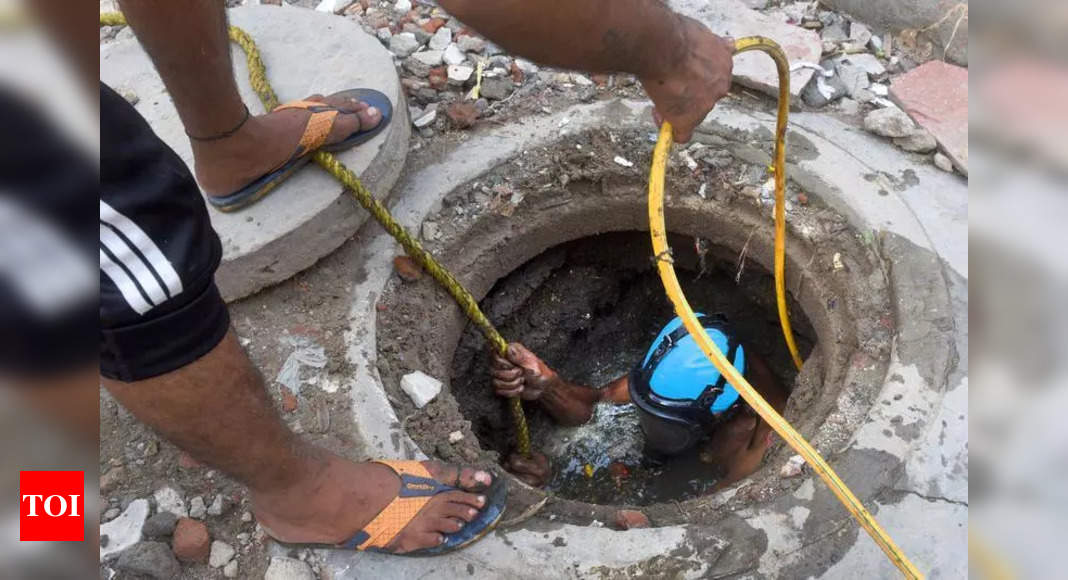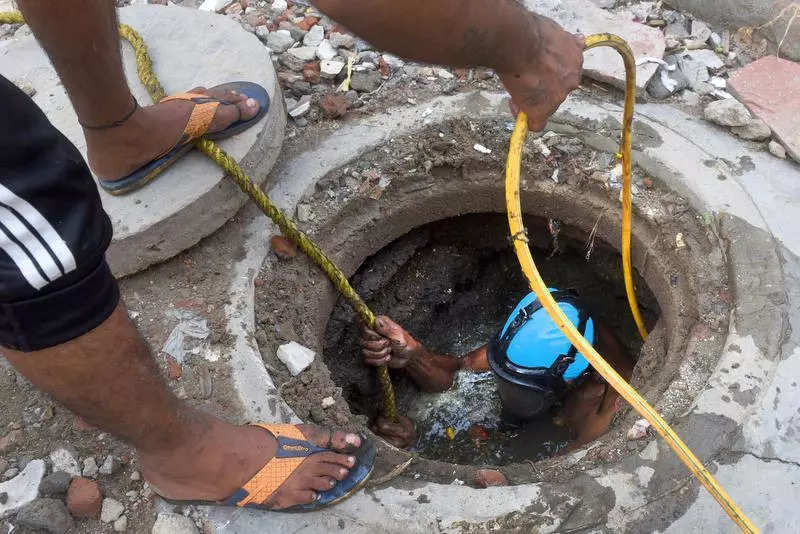Cleaning sewers using machines could potentially end the practice of manual scavenging. The Tamil Nadu govt, which once denied that the practice of manually cleaning sewers was still prevalent in the state, despite recording the highest number of deaths, is taking steps to mechanise cleaning of sewers. The initiative aims to improve the livelihoods of 213 sanitary workers, including manual scavengers — 39 children of deceased workers, 48 current sanitary workers, and 126 individuals from scheduled castes and scheduled tribes living below the poverty line.
On Dec 6, chief minister M K Stalin distributed 100 sewer-cleaning lorries to former sanitary workers. Of these, 60 have 6kL capacity, while the rest have 4kL capacity. Earlier this year, the Dalit Indian Chamber of Commerce and Industry, in collaboration with Metrowater, trained these workers to operate the sewer-cleaning vehicles. Loans with a 30% – 50% subsidy were provided under the Annal Ambedkar Business Champions scheme by the state MSME department.
Previously, these workers earned `7,500 – `9,000 a month under contractors. “Now, by owning these machines, they will earn at least `50,000 every month,” said Metrowater managing director T G Vinay. He said beneficiaries will be hired on a seven-year contract to maintain sewers in Royapuram, Thiru Vi Ka Nagar, Teynampet and Kodambakkam zones.
With subsidised loans, the workers can repay the debt quickly and improve their financial standing. “This scheme will also deter their children from taking up low-paying sanitary work,” he said.
However, not all beneficiaries are optimistic about the move. “Operational costs are high. Drivers demand `25,000, and helpers and cleaners cost an additional `20,000 combined. Even with a 50% subsidy, the scheme yields little profit,” said Mani, a manual scavenger who received one such vehicle. “I earned just `500 in one area. A permanent job would be better,” he said. Sharing his concerns, S Gopal, president of Metrowater labour welfare association, said, “Many Metrowater workers have been on contracts for over a decade without permanency. Once the contract ends, the govt may bring in private players again.” Earlier this month, 372 workers protested outside the Metrowater headquarters, demanding permanent jobs.
Samuel Velankanni D, Tamil Nadu convener of Safai Karamchari Andolan, called the scheme a positive step but emphasised that this is not a complete solution. “The govt must address their concerns and provide permanent jobs to ensure sustainable change,” he said.
On Dec 6, chief minister M K Stalin distributed 100 sewer-cleaning lorries to former sanitary workers. Of these, 60 have 6kL capacity, while the rest have 4kL capacity. Earlier this year, the Dalit Indian Chamber of Commerce and Industry, in collaboration with Metrowater, trained these workers to operate the sewer-cleaning vehicles. Loans with a 30% – 50% subsidy were provided under the Annal Ambedkar Business Champions scheme by the state MSME department.
Previously, these workers earned `7,500 – `9,000 a month under contractors. “Now, by owning these machines, they will earn at least `50,000 every month,” said Metrowater managing director T G Vinay. He said beneficiaries will be hired on a seven-year contract to maintain sewers in Royapuram, Thiru Vi Ka Nagar, Teynampet and Kodambakkam zones.
With subsidised loans, the workers can repay the debt quickly and improve their financial standing. “This scheme will also deter their children from taking up low-paying sanitary work,” he said.
However, not all beneficiaries are optimistic about the move. “Operational costs are high. Drivers demand `25,000, and helpers and cleaners cost an additional `20,000 combined. Even with a 50% subsidy, the scheme yields little profit,” said Mani, a manual scavenger who received one such vehicle. “I earned just `500 in one area. A permanent job would be better,” he said. Sharing his concerns, S Gopal, president of Metrowater labour welfare association, said, “Many Metrowater workers have been on contracts for over a decade without permanency. Once the contract ends, the govt may bring in private players again.” Earlier this month, 372 workers protested outside the Metrowater headquarters, demanding permanent jobs.
Samuel Velankanni D, Tamil Nadu convener of Safai Karamchari Andolan, called the scheme a positive step but emphasised that this is not a complete solution. “The govt must address their concerns and provide permanent jobs to ensure sustainable change,” he said.




